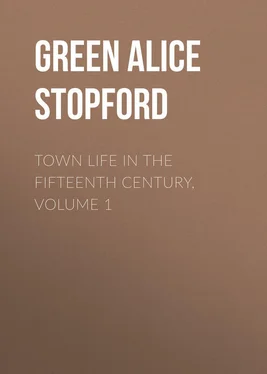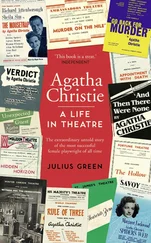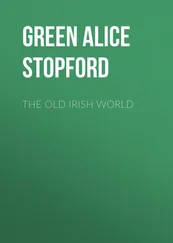Alice Green - Town Life in the Fifteenth Century, Volume 1
Здесь есть возможность читать онлайн «Alice Green - Town Life in the Fifteenth Century, Volume 1» — ознакомительный отрывок электронной книги совершенно бесплатно, а после прочтения отрывка купить полную версию. В некоторых случаях можно слушать аудио, скачать через торрент в формате fb2 и присутствует краткое содержание. Жанр: literature_19, foreign_antique, foreign_prose, Историческая проза, на английском языке. Описание произведения, (предисловие) а так же отзывы посетителей доступны на портале библиотеки ЛибКат.
- Название:Town Life in the Fifteenth Century, Volume 1
- Автор:
- Жанр:
- Год:неизвестен
- ISBN:нет данных
- Рейтинг книги:3 / 5. Голосов: 1
-
Избранное:Добавить в избранное
- Отзывы:
-
Ваша оценка:
- 60
- 1
- 2
- 3
- 4
- 5
Town Life in the Fifteenth Century, Volume 1: краткое содержание, описание и аннотация
Предлагаем к чтению аннотацию, описание, краткое содержание или предисловие (зависит от того, что написал сам автор книги «Town Life in the Fifteenth Century, Volume 1»). Если вы не нашли необходимую информацию о книге — напишите в комментариях, мы постараемся отыскать её.
Town Life in the Fifteenth Century, Volume 1 — читать онлайн ознакомительный отрывок
Ниже представлен текст книги, разбитый по страницам. Система сохранения места последней прочитанной страницы, позволяет с удобством читать онлайн бесплатно книгу «Town Life in the Fifteenth Century, Volume 1», без необходимости каждый раз заново искать на чём Вы остановились. Поставьте закладку, и сможете в любой момент перейти на страницу, на которой закончили чтение.
Интервал:
Закладка:
What with the inland and the outland trade, riches gathered into the hands of the merchants with bewildering rapidity, and with results which alarmed good conservatives. A statute of Parliament passed in 1455 lamented the good old days when Norfolk and Norwich used to employ only six or eight attorneys at the King’s Court, “in which time great tranquillity reigned in the said city and counties.” This “tranquillity” was broken by the manufacturing and export trade, for now a body of eighty or more lawyers busily frequented every fair and market and assembly, moving and inciting people to lawsuits, and while having nothing to live on but their attorneyship yet prospered so well that a wise legislature had to order that Norfolk should henceforth as of old have only six attorneys and Norwich two. 84 84 Blomfield, iii. 160. 33 H. VI. cap. vii.
Nor does it seem that Norwich was exceptionally wicked, even though in Piers Ploughman Covetousness is represented with a “Norfolk nose,” 85 85 Piers Ploughman, Introduction to Text C, xxxi.
for about the same time we read in Nottingham of twenty-four rolls written within and without with the pleas concerning trading questions of a single year. The whole country in fact shared in traders’ profits from king to peasant. It is calculated that in the reign of Henry the Eighth English exports so far exceeded imports as to bring about £50,000 yearly into the country, and the balance of trade inclined yet more strongly in favour of England under Henry the Seventh. 86 86 Schanz, ii. 35, 36.
Not only did the king lay up vast treasure, but the very goldsmiths’ shops in London were reported by a foreign traveller to contain more precious metals than all those of Rome, Milan, Florence, and Venice taken together. 87 87 Italian Relation, 42-3 (Camden Soc.); Schanz, i. 513; Heralds’ Debate, 65.
So far as the middle class is concerned evidence of accumulating wealth is to be found on every side, and the masses of the people in spite of the drain of war taxation shared in the general prosperity. In the middle of the fifteenth century Chief Justice Fortescue contrasts their state with that of the French commons. “These drink water; they eat apples with bread right brown made of rye. They eat no flesh, but if it be right seldom a little lard, or of the entrails and heads of beasts slain for the nobles and merchants of the land. They wear no woollen but if it be a poor coat under their outermost garment made of great canvas and called a frock. Their hosen be of light canvas and pass not their knee, wherefore they be gartered and their thighs bare. Their wives and children go barefoot; they may in none otherwise live… Their nature is wasted and the kind of them brought to nought. They go crooked and be feeble, not able to fight nor to defend the realm; nor they have weapon nor money to buy them weapon withal… But blessed be God, this land is ruled under a better law; and therefore the people thereof be not in such penury, nor thereby hurt in their persons but they be wealthy and have all things necessary to the sustenance of nature.” “In France the people salt but little meat except their bacon, for they would buy little salt” unless the king’s officers went round and forced every household to take a certain measure, such as they thought reasonable. But “this rule would be sore abhorred in England, as well by the merchants that he wont to have their freedom in buying and selling of salt as by the people that use much to salt their meats.” 88 88 Plummer’s Fortescue, 114-5, 132. Compare Bacon’s Henry the Seventh, 71-72.
An industrial revolution on such a scale as this brought a political revolution in its train. The English population, says a writer of about 1453, “consists of churchmen, nobles, and craftsmen, as well as common people.” 89 89 Heralds’ Debate, 61, 1453-1461.
It was a novel and significant division. Traders and manufacturers took their places somewhat noisily beside their fellow politicians of older standing, filling the whole land till it seems for a moment as if nothing counted any more in English life save its middle class – a busy, hard, prosperous, pugnacious middle-class. Slowly emerging from its early obscurity, in this century it had arrived at power definitely, ostentatiously, carrying a proud look and a high stomach, intent on its own affairs, heedless of the Court, regardless of ministers save when it had to bribe them, irreverent to the noble, the “proud penniless with his painted sleeve,” 90 90 Richard the Redeless, passus iii. 172.
tolerant of ecclesiastics and monks only so long as they could be kept rigidly within their allotted religious functions. 91 91 Brinklow’s Tracts, published in the first half of the sixteenth century, afford interesting illustrations of the type of radical politician formed in the towns. His proposal for a single chamber and the list of reforms sketched out are not more significant than his criticism of parliamentary despotism and inefficiency, “This is the thirteenth article of our creed added of late, that whatsoever the Parliament doth must needs be well done. and the Parliament, or any proclamation out of the parliament time cannot err … then have ye brought Rome home to your own doors and given the authority to the King and Parliament that the cardinal bishops gave unto the Pope … if this be so, it is all vain to look for any amendment of anything.” Brinklow’s Complaynt, E. E. Text Society, 35. See also pp. 8, 12.
Henceforth in the workshop and the market-place home politics and foreign affairs were discussed from a new point of view – the interest of the trader and the manufacturer; and the middle and working classes presently began to fling to the winds the old statecraft whose maxims had done service before their advent among the makers of the national policy.
In the matter of our foreign relations we see the drift of public thought and discussion reflected in a pamphlet by which one of the King’s ministers, Moleyns, Bishop of Chichester, sought to appeal to the popular imagination and define our right attitude to continental peoples. His Libel (or Little Book) of English Policy, published about 1445, was clearly designed for the vulgar use. 92 92 Libel of English Policy (Political Poems and Songs, ii. 157-205. Roll’s series, ed. Wright). The Libel was probably written after 1436. The Bishop was murdered in 1450. (Agric. and Prices, iv. 533.)
Written, as the common taste of the day demanded, in rhyming form where the absence of poetic art and the inspiration of a plain common-sense constituted a double claim on public attention, it made its frank appeal to the prejudice of the stall-holder in the market and of the craftsman who lived by making his homely English wares – men who saw in foreign products articles whose sinful extravagance could only be matched by the worthlessness that distinguished all work not turned out by an Englishman. With vigorous strokes the Bishop sketched the outlines of England’s trading interests with every nation in Europe, and at the end of each paragraph passionately drove home his moral. Laying hold of the fundamental axiom that the sole and undivided concern of England in all her foreign relations was the protection of her commerce, he maintained that so long as she kept a firm hold on the narrow seas between Dover and Calais, she might rule the trade of the world. For there all commerce from north to south or south to north had to pass through the strait gate held by her sentinels on either side; so that while an inexorable fate drove the nations into her net, England safely hidden behind her wall of defence, the stormy Channel, need have no care so long as she looked well to her navy and kept it swift to seize her prey and strong to drive her enemies back from looking over the wall. At its very outset the commercial society had thus its Cobden to preach after his kind the doctrine of non-intervention and the kingdom of the seas.
Интервал:
Закладка:
Похожие книги на «Town Life in the Fifteenth Century, Volume 1»
Представляем Вашему вниманию похожие книги на «Town Life in the Fifteenth Century, Volume 1» списком для выбора. Мы отобрали схожую по названию и смыслу литературу в надежде предоставить читателям больше вариантов отыскать новые, интересные, ещё непрочитанные произведения.
Обсуждение, отзывы о книге «Town Life in the Fifteenth Century, Volume 1» и просто собственные мнения читателей. Оставьте ваши комментарии, напишите, что Вы думаете о произведении, его смысле или главных героях. Укажите что конкретно понравилось, а что нет, и почему Вы так считаете.












